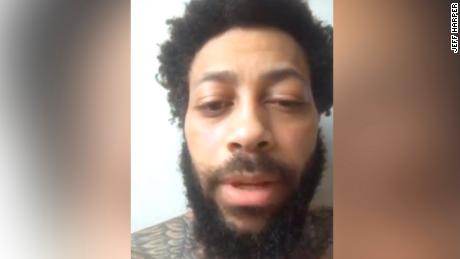When they brought him his passport, Jeff Harper thought he was getting out.
He stared at the document, its navy cover embossed with the United States seal, as it gradually dawned on him that the Chinese police officer, in his broken English, was describing something quite different.
"He said something about a residential surveillance house," Harper said. "I had no idea what that was."
It was early January 2020. Harper, a 6-foot, 8-inch (203 centimeter) professional basketball player, had arrived in the southern Chinese city of Shenzhen, hoping to land a new contract after playing in Norway, Japan and a host of other countries.
Harper had been in China for less than a week when everything went wrong. Walking back from a comedy show with a friend in the early hours of January 7, he said he saw a violent altercation between a man and a partially clad woman on the street and ran over to help.
According to Harper, he pushed the man out of the way, causing him to fall to the ground. The man then left the scene, Harper said. He and his friend checked that the woman was OK, were told she was, and Harper returned to his hotel.
Hours later, police turned up at his door. In the intervening hours, the man he'd shoved had turned up in hospital, they said, and was now in a coma.
Harper texted his girlfriend back home in Boise, Idaho: "I'm in some trouble."
Victoria Villareal said that when she finally got Harper on the phone, "the first thing I asked was, 'Were you trying to help somebody?'"
She spoke to Harper in the police station, as the cops decided whether to charge him and before they confiscated his phone and passport. It would be two weeks before Harper saw that document again, in the hands of the officer he thought was coming to release him.
But the man Harper says he pushed had not woken up from his coma, and soon after Harper was moved to "residential surveillance at a designated location" (RSDL), a system by which people can be detained in China for up to six months without charge. There, he was informed that the man had died. The exact circumstances of the man's injury and death remain unclear, police did not respond to a request for further information.
A police document seen by CNN, dated January 20, said Harper was being investigated for causing serious injury by negligence. Harper did not dispute that he had pushed the man but said he did not appear to be seriously injured when he left the scene of the original incident.
As it was sinking in for Harper that he was not going home to Boise anytime soon, Villareal was frantically researching lawyers in Shenzhen, contacting US diplomats, and emailing and calling anyone she knew who might have some experience with China.
This brought her in touch with Peter Humphrey, a one-time journalist turned corporate investigator, who had an intimate knowledge of the Chinese legal system. In 2013, it had been Humphrey who was sitting in a Chinese cell waiting to find out what would become of him, the start of almost two years in various forms of detention, for a crime he says he didn't commit.













0 Comments